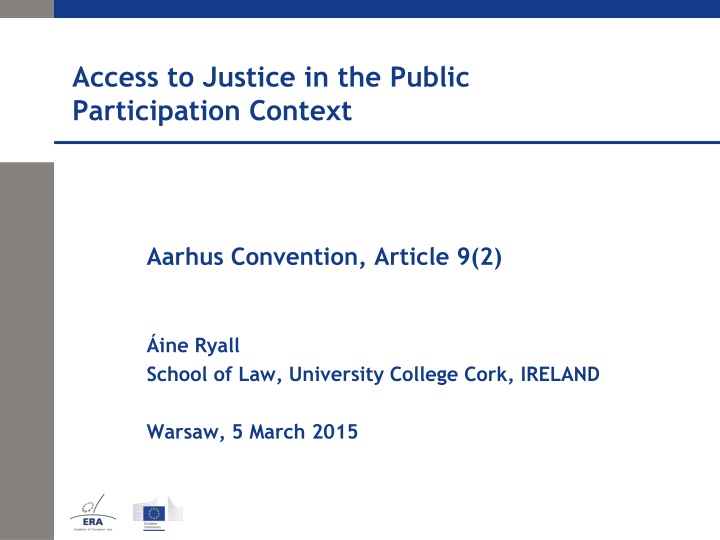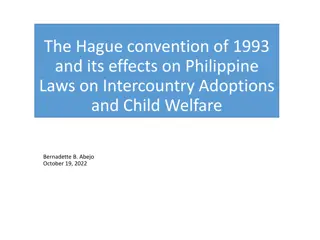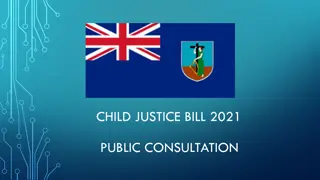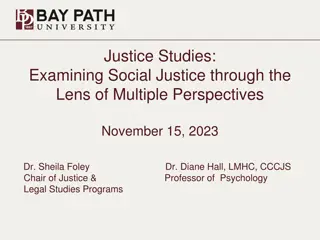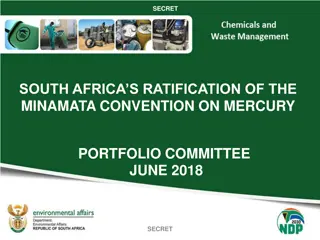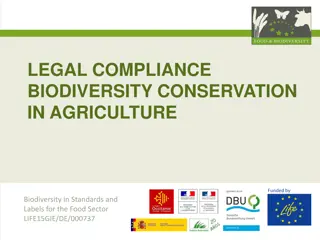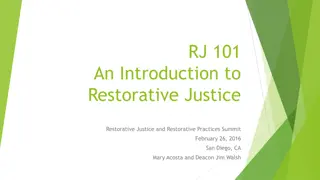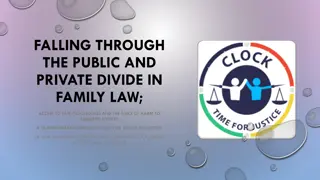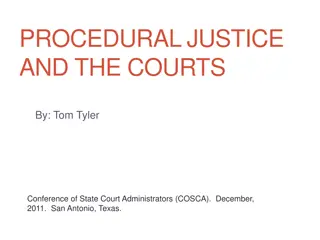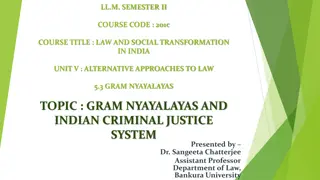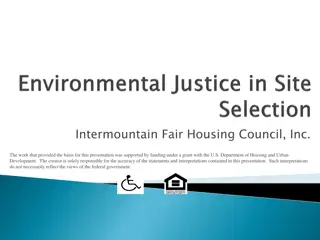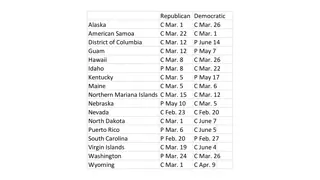Access to Justice in Public Participation Context: Aarhus Convention
Explore the legal framework and significance of accessible review procedures in the context of the Aarhus Convention, focusing on enforcing the right to participate in environmental decision-making through analysis of EU law provisions and CJEU case law. Consider the role of national judges, current issues, and future developments in ensuring effective remedies and protecting public interests.
Download Presentation

Please find below an Image/Link to download the presentation.
The content on the website is provided AS IS for your information and personal use only. It may not be sold, licensed, or shared on other websites without obtaining consent from the author.If you encounter any issues during the download, it is possible that the publisher has removed the file from their server.
You are allowed to download the files provided on this website for personal or commercial use, subject to the condition that they are used lawfully. All files are the property of their respective owners.
The content on the website is provided AS IS for your information and personal use only. It may not be sold, licensed, or shared on other websites without obtaining consent from the author.
E N D
Presentation Transcript
Access to Justice in the Public Participation Context Aarhus Convention, Article 9(2) ine Ryall School of Law, University College Cork, IRELAND Warsaw, 5 March 2015
Objectives and Outline Presentation - Introduce Aarhus Convention & EU Law provisions governing access to justice to enforce the right to participate in environmental decision-making at Member State level - Analyse the CJEU case law on the access to justice clauses in the EIA Directive & the Industrial Emissions Directive
Objectives and Outline Presentation - Consider the role of the national judge in delivering access to justice under EIA Directive & Industrial Emissions Directive - Identify and explore current issues on access to justice at national level via a Case Study - Consider likely future developments
Significance of accessible review procedures & effective remedies? - Rule of Law - Environmental rights, including the right to participate in decision-making, are meaningless without effective remedies - Aarhus Convention, Recital 18: to ensure the public s legitimate interests are protected & the law is enforced
Legal Framework: Three Levels of Legal Authority - Aarhus Convention: Article 9(2), (4) & (5) - Directive 2003/35/EC: introduced access to justice clauses to EIA Directive and Industrial Emissions Directive - National measures and review procedures designed to transpose Aarhus and EU law obligations
Aarhus Convention, Public Participation & Access to Justice Article 2 Key definitions: the public & the public concerned Article 3(8) Acknowledges power of national courts to award reasonable costs in judicial proceedings. But no definition of reasonable is provided Article 6 Right to participate in decision-making on specific activities
Aarhus Convention, Public Participation & Access to Justice Article 9(2) Right of access to a review procedure for the public concerned to challenge the substantive and procedural legality of any decision, act or omission subject to the provisions of Article 6 [...] Standing rules & special provision for ENGOs. Aim is to deliver wide access to justice Article 9(3) General right of access to a review procedure to enforce environmental laws
Aarhus Convention, Public Participation & Access to Justice Article 9(4) Sets minimum standards for review procedures Must provide adequate and effective remedies , including injunctive relief, where appropriate, & must be fair, equitable, timely and not prohibitively expensive Written and publicly accessible decisions must be provided
Aarhus Convention, Public Participation & Access to Justice Article 9(5) Information must be provided to the public on access to review procedures Parties must consider the establishment of appropriate assistance mechanisms to remove or reduce financial & other barriers to access to justice
EU Law: General Principles National procedural autonomy Member States have discretion in implementing Aarhus Article 9, subject to the principles of equivalence & effectiveness Member States must determine which court of law, or independent & impartial tribunal, has jurisdiction to carry out the review procedure & what procedural rules will apply
EU Law: Directive 2003/35/EC Directive 2003/35/EC the public participation directive Introduced explicit access to justice clauses to: - EIA Directive (Art.10a) now Art. 11 of Consolidated EIA Directive (Directive 2011/92/EU) - IPPC Directive (Art. 15a) now Art. 25 of Industrial Emissions Directive (IED) (Directive 2010/75/EU) Modelled closely on Aarhus Article 9(2) and (4), but with some interesting variations
EIA directive & access to justice Article 11: Aims to implement Aarhus Article 9(2) & (4) No express reference to obligation to deliver adequate and effective remedies , including injunctive relief But these requirements already exist under EU law and established CJEU jurisprudence on effective judicial protection No equivalent of Aarhus Article 9(5) regarding duty to consider establishing financial assistance mechanisms
EIA directive & access to justice Directive 2014/52/EU - amends EIA Directive Deadline for transposition: 16 May 2017 No changes to the access to justice clause But: a new obligation has been added (a new Article 10a) requiring Member States to set down rules providing for penalties applicable to infringements of national EIA rules. These penalties must be effective, proportionate & dissuasive
CJEU Jurisprudence on access to justice clause in EIA directive & IED General principles emerging from CJEU jurisprudence: - EU is a Party to the Aarhus Convention Convention is an integral part of EU legal order - EIA Directive & IED, including access to justice clauses, must be interpreted in light of the wording and purpose of Aarhus Convention
CJEU Jurisprudence on access to justice clause in EIA directive & IED - Strong emphasis on delivering the goal of wide access to justice to tighten Member State discretion - Strong emphasis on the role of ENGOs in the enforcement of environmental law - CJEU has championed the public interest in effective environmental protection
CJEU Jurisprudence on access to justice clause in EIA directive & IED Standing & right of access to review procedure Case C-263/08, Djurg rden-Lilla V rtans Milj skyddsf rening Scope of Member State discretion to prescribe criteria that ENGOs must meet in order to be entitled to invoke the right of access to a review procedure [40] [52] Any criteria must deliver wide access to justice & must ensure effectiveness of EIA directive
CJEU Jurisprudence on access to justice clause in EIA directive & IED Member States may require an ENGO to have as its object the protection of nature & the environment Swedish standing rules governing ENGOs provided that only associations with at least 2,000 members could bring an appeal against an environmental decision CJEU: Number of members required cannot be set at such a level that it runs counter to the objectives of the EIA directive, including facilitating judicial review
CJEU Jurisprudence on access to justice clause in EIA directive & IED Participation in environmental decision-making under Article 6 of the EIA directive is separate & has a different purpose from judicial review [38] and [48] Participation in the decision-making procedure has no effect on the conditions for access to the review procedure [38] Suggests that participation in the (administrative) decision- making procedure is not a pre-condition to the right of access to a review procedure
CJEU Jurisprudence on access to justice clause in EIA directive & IED Case C-240/09, Lesoochran rske zoskupenie (Grand Chamber) Slovak Brown Bear case Strong emphasis on ensuring effective judicial protection in the fields covered by EU environmental law Aarhus Article 9(3) does not have direct effect in EU law But: duty on national courts to interpret domestic law, to the fullest extent possible, to ensure consistency with Aarhus Article 9(3)
CJEU Jurisprudence on access to justice clause in EIA directive & IED Case C-115/09, Bund f r Umwelt und Naturschutz (Trianel) Under national law, access to a review procedure was conditional on demonstrating that the contested administrative decision impaired an individual right CJEU: Such a limitation could not be applied to ENGOs Aarhus & EIA directive give ENGOs a right to protect the general public interest no requirement to demonstrate impairment of an individual right can be imposed on ENGOs
CJEU Jurisprudence on access to justice clause in EIA directive & IED Projects authorised by legislative act Joined Cases C-128/09 to C-131/09, C-134/09 & C-135/09, Boxus (Grand Chamber) & Case C-182/10, Solvay When a project is adopted by a legislative act, a review procedure must be available to verify that the legislative act in question fulfils certain conditions & to ensure that the objectives of the EIA directive are met through the legislative process
CJEU Jurisprudence on access to justice clause in EIA directive & IED Interim measures to suspend the application of a permit pending final determination of review procedure Case C-416, Kri an (Grand Chamber) The effectiveness of the right of access to a review procedure under the access to justice clause in the IPPC directive (now IED) demands that the public concerned must have the right to seek interim measures
CJEU Jurisprudence on access to justice clause in EIA directive & IED Review procedure must not be prohibitively expensive Case C-427/07, Commission v Ireland A judicial discretion to determine costs liability, for example by disapplying the usual loser pays principle in certain circumstances, was not sufficient to transpose the ban on prohibitive costs
CJEU Jurisprudence on access to justice clause in EIA directive & IED Case C-260/11, Edwards Case C-530/11, Commission v United Kingdom Meaning of not prohibitively expensive review procedure? Criteria to be applied by national court in assessing that requirement? Objective is to give public concerned wide access to justice to ensure the public play an active role in environmental protection
CJEU Jurisprudence on access to justice clause in EIA directive & IED The public concerned should not be prevented from seeking review by the courts by reason of the financial burden that might arise as a result Account must be taken of the interest of the person wishing to defend their rights & the public interest in the protection of the environment
CJEU Jurisprudence on access to justice clause in EIA directive & IED Not an exclusively subjective approach, but also an objective analysis of the costs involved Costs must not exceed the financial resources of person concerned and must not be objectively unreasonable Relevant assessment criteria: National legal context must be considered, incl. all the relevant provisions of national law, any national legal aid scheme or costs protection regime
CJEU Jurisprudence on access to justice clause in EIA directive & IED Other factors that may be taken into account: - Situation of the parties concerned - Whether applicant has a reasonable prospect of success - Importance of what is at stake for the applicant & for protection of the environment - Complexity of the relevant law & procedure - Potentially frivolous nature of the claim - Costs already incurred at earlier levels in the same dispute
CJEU Jurisprudence on access to justice clause in EIA directive & IED Cross-undertakings for the grant of interim relief Case C-530/11, Commission v United Kingdom Ban on prohibitive expense also applies to the financial costs resulting from measures which the national court might impose as a condition to the grant of interim measures (e.g. an undertaking in damages)
CJEU Jurisprudence on access to justice clause in EIA directive & IED Temporal application of access to justice clause in EIA directive? Case C-72/12, Altrip Access to justice obligation applies to developments consent procedures initiated before 25 June 2005 (the deadline for transposition of Dir. 2003/35/EC) when they result in the granting of development consent after that date
CJEU Jurisprudence on access to justice clause in EIA directive & IED Limitation on grounds on which legality of decision may be challenged? Case C-72/12, Altrip Member States cannot limit the right to challenge a decision to situations where no EIA was carried out It must also extend to situations were the EIA was allegedly defective
CJEU Jurisprudence on access to justice clause in EIA directive & IED Case C-137/14, Commission v Germany Infringement proceedings pending before CJEU Raises a number of interesting issues around implementation of the access to justice clauses in the EIA Directive & the IED Including: restrictions on standing and limitations on the grounds on which the legality of a decision may be challenged
CJEU Jurisprudence on access to justice clause in EIA directive & IED Remedies for breach of EIA directive Case C-420/11, Leth Fact that an EIA was not carried out, in breach of EIA directive, does not, in principle, by itself, confer a right to compensation on an individual for purely pecuniary damages caused by the decrease in value of their property due to environmental effects National court must examine the facts & determine whether the criteria for State liability have been established
CJEU Jurisprudence on access to justice clause in EIA directive & IED Private property rights? Not a trump card The right to property is not an absolute right must be viewed in relation to its social function & its exercise may be restricted for objectives of general interest including the protection of the environment Case C-416, Kri an (Grand Chamber) Cf. Case C-206/13, Siragusa
CJEU Jurisprudence Remedies where Member State is found to be in breach of EU environmental law Case November 2014 C-404/13, Client Earth, judgment delivered 19 In the event of non-compliance with the Air Quality Directive (Directive 2008/50/EC) Arts 13 &/or 22, what remedies must a national court provide?
Case C-404/13 Client Earth Strong statements from CJEU on effective legal protection at national level in the fields covered by EU law [paras 52-54] Recalls Case C-237/07 Janecek & the clear obligation on Member States to establish an air quality plan that meets certain requirements Natural or legal persons directly concerned must be in a position to bring an action before the national courts to require competent authorities to meet this obligation [paras 55 and 56]
Case C-404/13 Client Earth Where a Member State has failed to comply with its obligation to establish an air quality plan as required under Directive 2008/50, then: It is for the national court to take any necessary measure, such as an order in the appropriate terms , so that the national authority concerned establishes an air quality plan as required by Directive 2008/50.
Impact of Charter of Fundamental Rights of the EU Article 47 Right to an effective remedy Article 47(3) Legal aid shall be made available to those who lack sufficient resources in so far as such aid is necessary to ensure effective access to justice
Role of the National Judge Enforce the right to participate in environmental decision- making be proactive there is a lot at stake here EU law becoming more prescriptive about how enforcement/remedies operate at Member State level Aarhus/EU law major impact on Member State legal systems. Potentially highly disruptive impact Unexpected & very challenging consequences for national standing rules & costs regimes in particular
Role of the National Judge Are national rules & procedures compatible with Aarhus/EU law? Difficult points of interpretation continue to arise Some guidance from existing body of CJEU jurisprudence A reference for a preliminary ruling may be necessary Extra judicial engagement highlight issues & solutions
Future Directions? We need legal certainty & predictability urgently Highly complex & rapidly evolving body of law strong case for judicial specialisation? The requirement that the review procedure must be timely - where will this lead? Serious resource implications here Relationship between CJEU and Aarhus Convention Compliance Committee
Future Directions? The national judge as environmental champion Legal tools at the national judge s disposal Impact of the new Article 10a in the EIA directive (penalties)? Difficult and gradual transition to an Aarhus-compliant system Mainstream Aarhus obligations at local level
What will you contribute to the realisation of Aarhus obligations? Courts are the cornerstones of democracy & the Rule of (Environmental) Law
